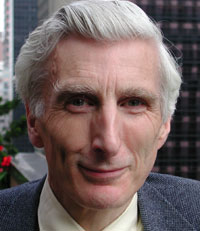
The BBC’s HARDtalk interviewer Stephen Sackur engaged this week with the eminently reasonable Martin Rees, President of the Royal Society. The interview covered a range of topics, and climate change was among them. It could hardly not be, given the seriousness with which Rees regards it. Sackur chose to introduce the subject by suggesting that some of the confusion over climate change among the general public may be “because some scientists can’t decide whether they’re scientists – completely impartial, independent, guided only by data – or whether they’re campaigners”. Who he had in mind he didn’t say, or more likely didn’t know. Perhaps he was suggesting Rees falls into that category.
If so, Rees didn’t rise to the bait but took the opportunity to affirm that there is wide acceptance in the scientific community that climate change is a matter for serious concern and that nothing that has happened in the last year weakens the evidence for this.
He acknowledged, however, that there is plenty of scope for debate as to what we should do about it because we have to decide what sacrifices we make now in order to guard against risks of uncertain magnitude in the future.
Incidentally, when Rees mentions the uncertainties of future predictions it should be noted that he means that it is uncertain whether the level of warming this century will be two degrees or as much as a catastrophic five or more degrees.
Confronted with Monbiot’s latest fear that climate enlightenment is dead Rees replied that he wouldn’t go as far as that but hoped rather that the debate could be reinvigorated. At this point he mentioned the article he and Anthony Giddens have just written and which has now been posted on Hot Topic. Sackur pounced, asking how that can be done by scientists who must follow the data rather than campaign.
Rees patiently agreed that it is important to separate out the science, which is the basis for the policy decisions, from the policy decisions themselves. As a scientist “I see it as my job to ensure that the science with all its uncertainties is made available to politicians.”
But then came the telling aspect of scientific responsibility: “But as citizens I think we want to make sure that issues which are longer term and important don’t always get trumped by the urgent and immediate.”
“Scientists need to get noisier do they?” asked Sackur.
“Not just scientists, but many people who are concerned about the long-term future of the environment and the climate need to urge our politicians to give some weight to long-term issues.”
Behind the politeness and carefulness of Rees’s statements there is clearly a refusal to accept the foolishly simplistic notion that climate scientists should be corralled in the domain of their science and should leave the policy makers of the world to work out for themselves whether they are going to respond to the science and how. The fact of the matter is that politicians need to be constantly challenged to face up to the seriousness of the issue. And scientists are citizens with the same interest as the rest of us in an appropriate level of political response to a grave threat.
The dichotomy which Sackur used to get the discussion under way is a false one. It’s also a very tired one. I was surprised that an accomplished interviewer such as Sackur wasn’t ready with an approach which showed a more alert awareness of why scientists like Rees are impelled to sound alarms. It seemed to fit with a critical Climate Progress post from Joseph Romm recently on what he discerns as a decline in the BBC’s coverage of climate change. In the post he reports hearing from a former BBC producer colleague that internal editorial discussions now under way at the BBC on planning next year’s news agenda have explicitly parked climate change in the category “Done That Already, Nothing New to Say”!
Reinvigorating the debate, Rees’s preferred path, is not going to be made easy. But we can be thankful that he and other scientists are committed to the effort.
